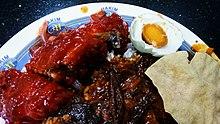 Nasi kandar served together with fried chicken, salted egg and Pappadom. | |
| Type | Dish |
|---|---|
| Course | Lunch and dinner |
| Place of origin | Malaysia |
| Region or state | Penang |
| Main ingredients | Rice, meat and curry |
Nasi kandar is a popular northern Malaysian dish, which originates from Penang. It was popularized by Tamil Muslim traders from India. It is a meal of steamed rice which can be plain or mildly flavored, and served with a variety of curries and side dishes.
Etymology
The name nasi kandar came about from a time when nasi (rice) hawkers or vendors would balance a kandar pole on their shoulder with two huge containers of rice meals. The name has remained today and Nasi Kandar's word appears in most Tamil Muslim or “Malaysian Mamak” restaurants and Indian-Muslim food stall.
Description
The rice for a nasi kandar dish is often placed in a wooden container about three feet high, giving it a distinctive aroma. The rice is accompanied by side dishes such as fried chicken, curried beef spleen, cubed beef, lamb, fish roe, fried prawns or fried squid.[1] The vegetable dish would usually be (brinjal or "terong") (aubergine), okra (lady fingers or "bhindi") or bitter gourd. A mixture of curry sauces is poured on the rice. This is called 'banjir' (flooding) and imparts a diverse taste to the rice.
Traditionally, nasi kandar is always served with its side dishes on a single plate. Nowadays, small melamine bowls are used for the side dishes. Nevertheless, the curry sauce mix is always poured directly onto the rice.
In recent years, several chain restaurants have appeared such as Nasi Kandar Subaidah, Nasi Kandar Nasmir, Pelita Nasi Kandar, Nasi Kandar Astana Mathina and Kayu Nasi Kandar. Purists have disputed its taste compared to the original Penang versions. In parts of northern Peninsular Malaysia, the rice is coloured yellow with herbs and the dish is referred to as "nasi ganja", though in fact no "ganja" (cannabis) is actually used in its preparation.